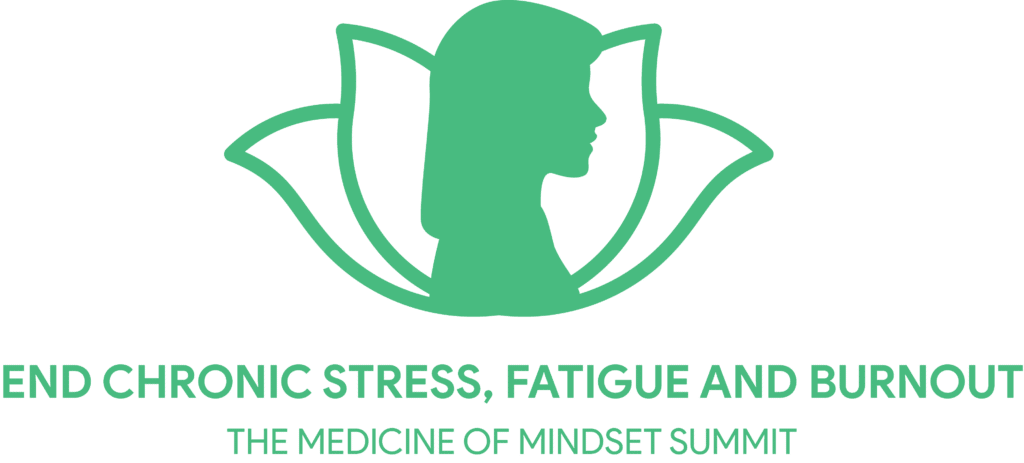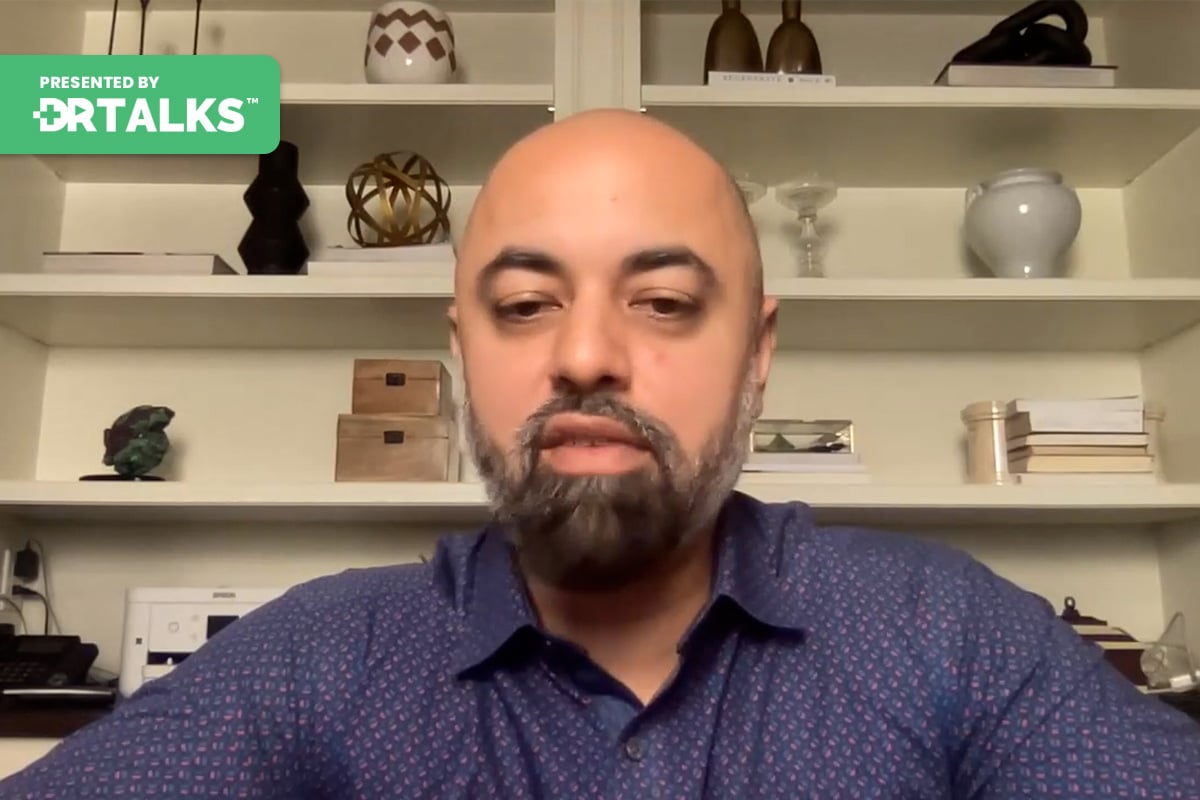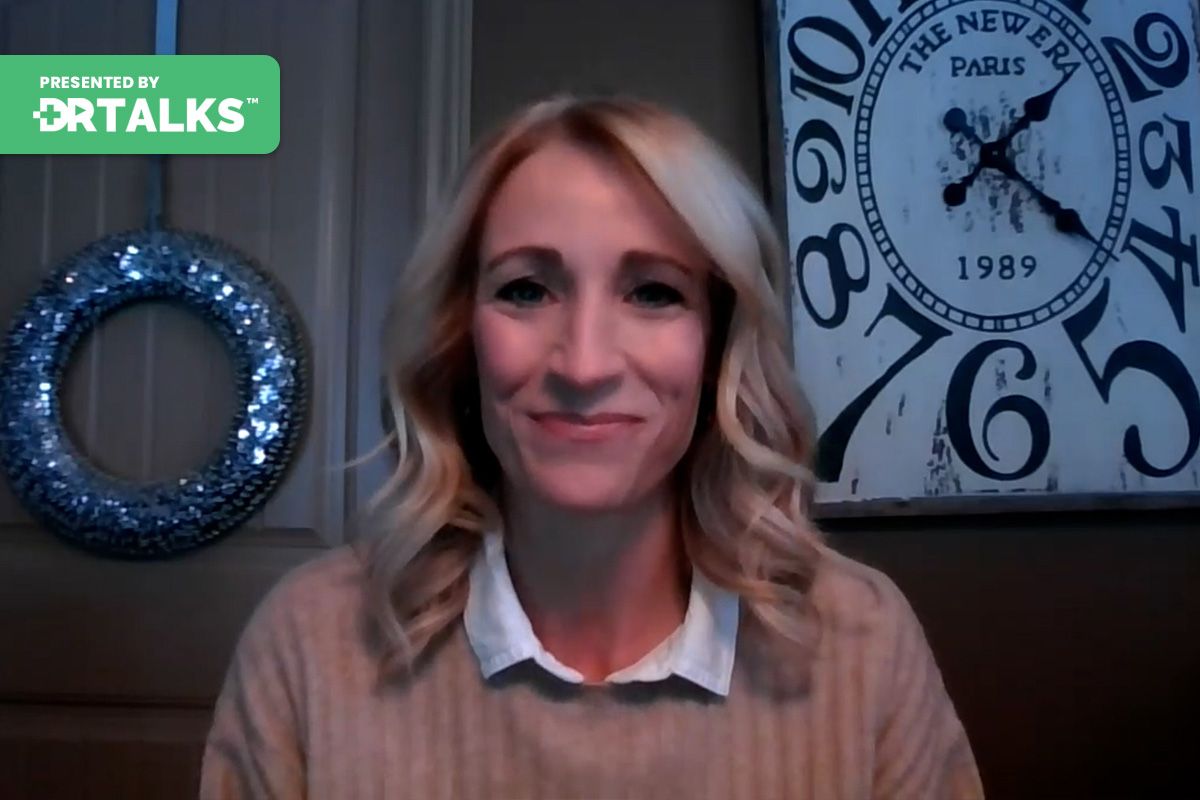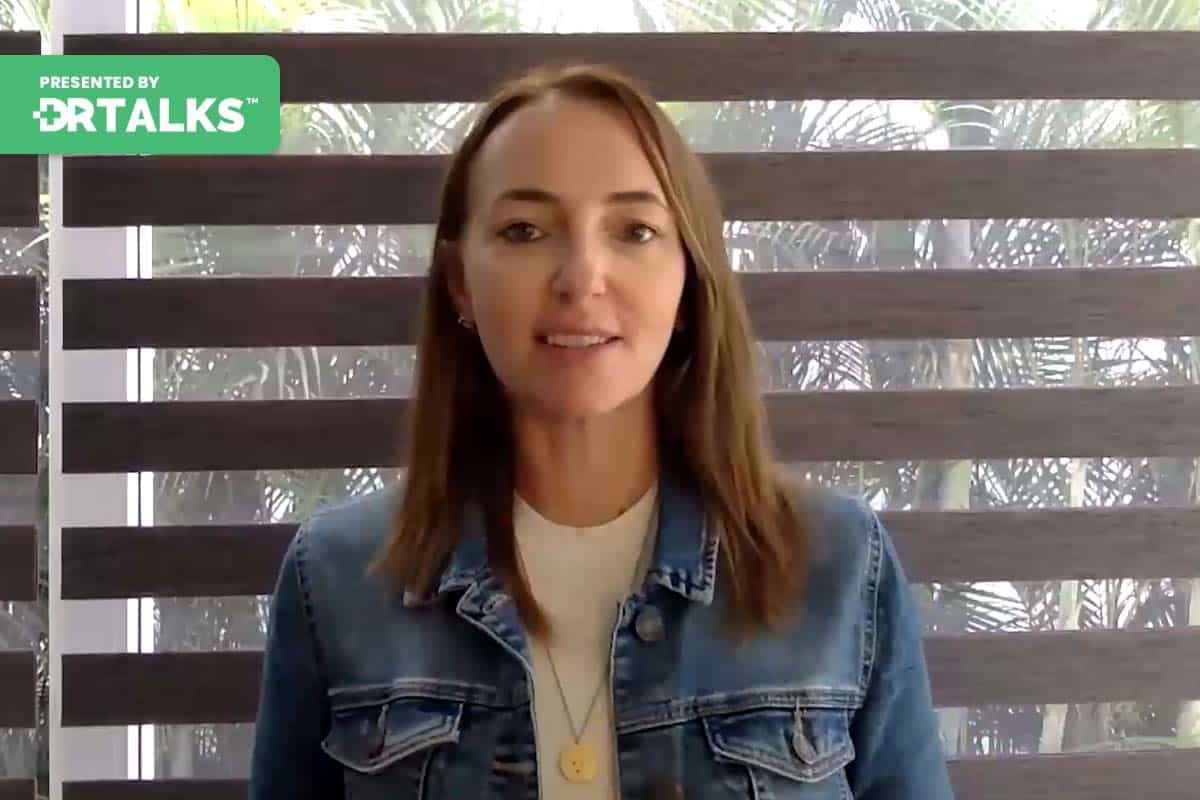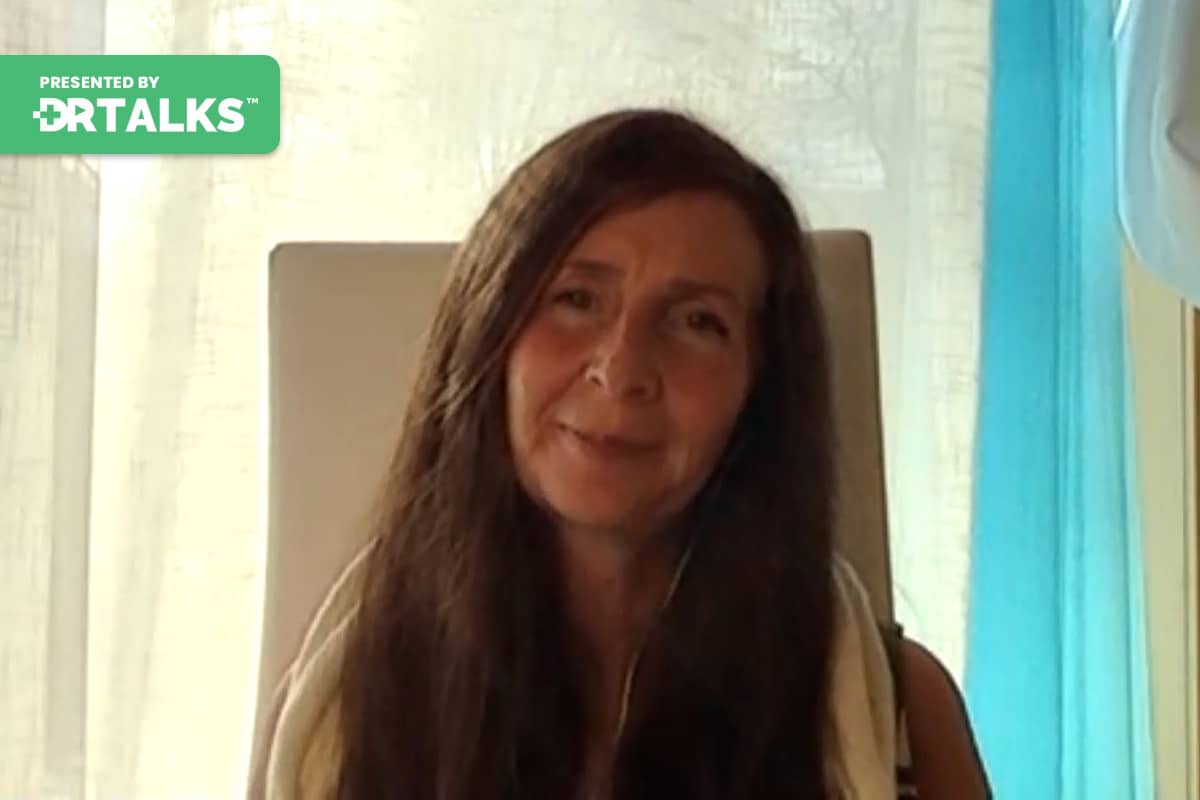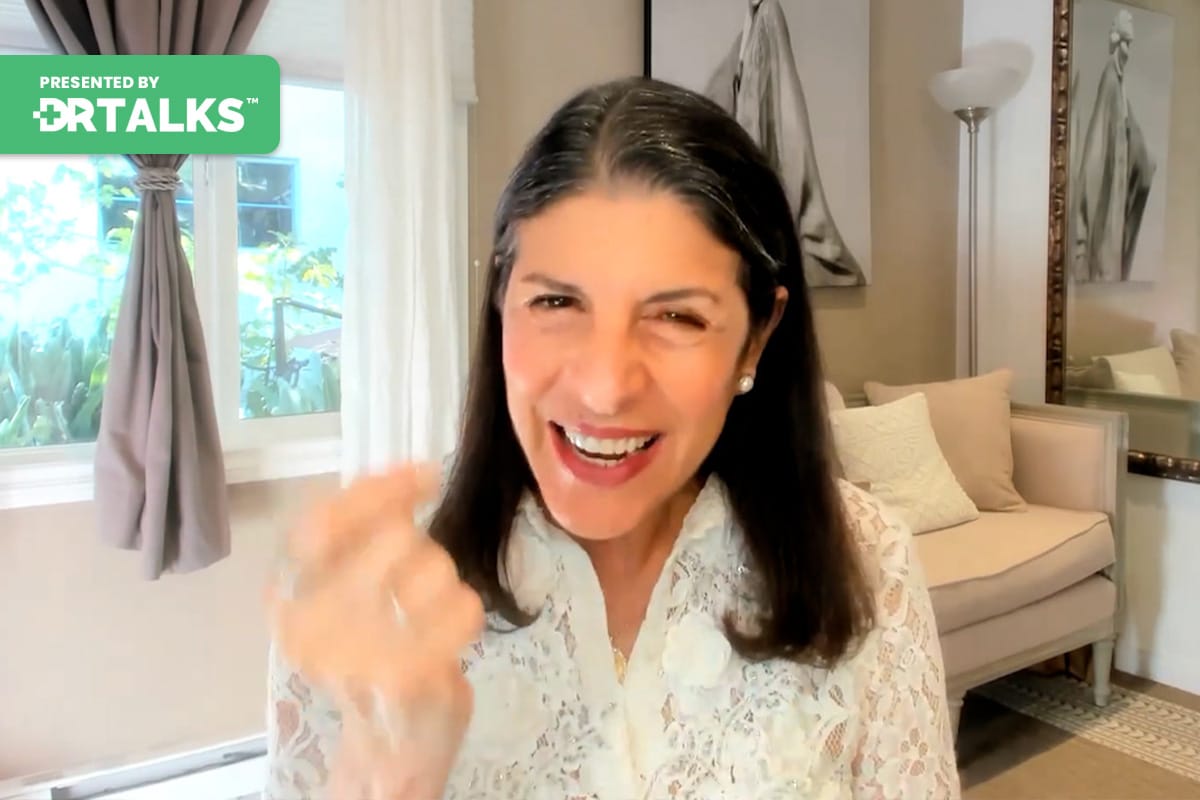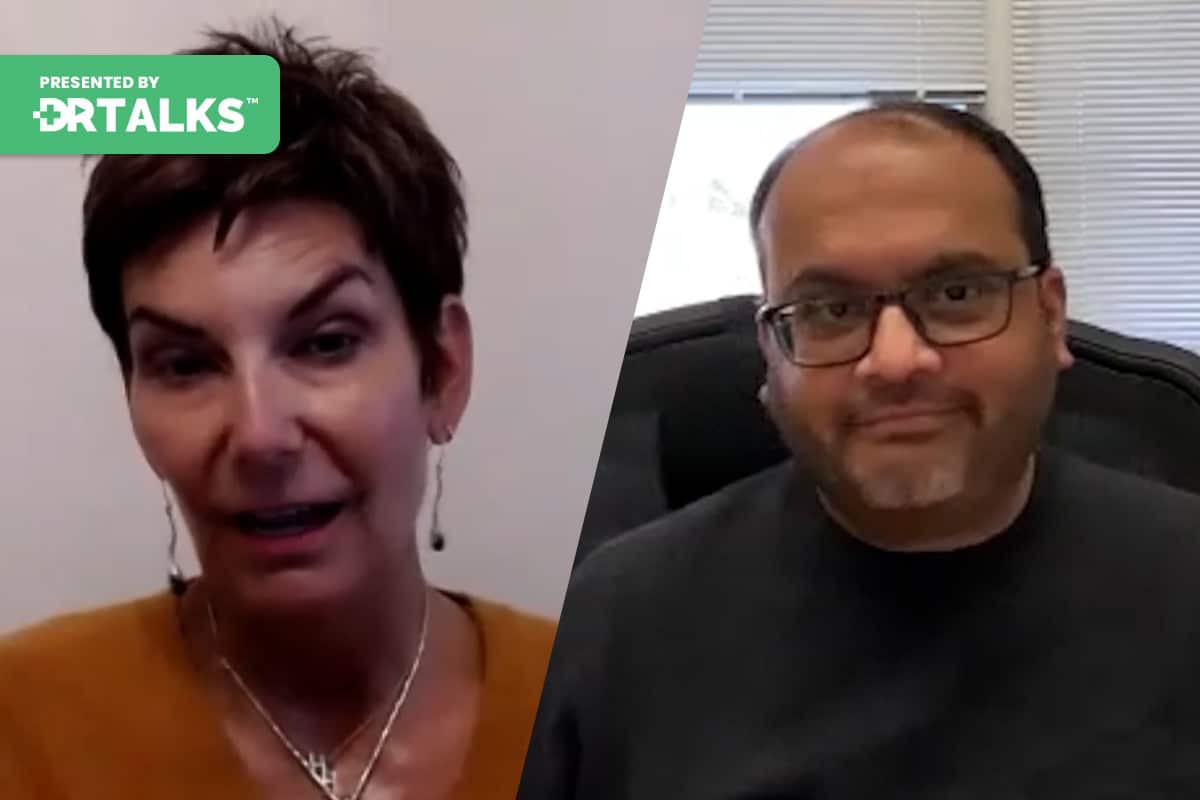Join the discussion below

Jana Danielson is an award-winning wellness entrepreneur who through her own experience with physical pain turned her mess into her message which has now become her mission. She is an Amazon Best Selling Author, owner of Lead Pilates and Lead Integrated Health Therapies, her bricks & mortar businesses and the... Read More

Kashif Khan is the Chief Executive Officer and Founder of The DNA Company, where personalized medicine is being pioneered through unique insights into the human genome. With the largest study of its kind globally, The DNA Company has developed a functional approach to genomic interpretation overlaying environment, nutrition, and lifestyle... Read More
- There is a connection between our mood & behavior and our genes
- There is also a connection between our epigenetics and our health
- We will cover these topics and will identify the other systems in our body, other than our brain, that can be a major driver of our mindset
Jana Danielson
Well, welcome back everyone, we are back here at the virtual medicine of mindset summit stage and I have my next speaker with me and I’m going to give him just a little bit of an introduction because Kashif Khan is really unique to this whole week of speakers. He is the CEO and founder of the D. N. A company where personalized medicine is being pioneered through unique insights into the human genome. So I’m excited to chat with him about that. And he’s also the host of the unfilled podcast. Kashif grew up in Vancouver Canada and now he’s in Toronto. We were just talking off camera and he said he’s been to Saskatoon where I was from in the minus 40 degrees Celsius weather. So he gets it when your teeth, your teeth start to literally chatter.
He developed a very industrious entrepreneurial spirit from a young age, He advised a number of high growth startups prior to his tenure with the D. N. A. Company and as he dove into the field of functional genomics as the CEO of the company, it was revealed that his very own neural wiring was actually genetically designed to be entrepreneurial. Now we’re gonna, I want to touch on that However, his genes, okay, this is what the cool part of this. His genes revealed a particular sensitivity to pollutants and now seeing his health with a completely new set of lenses, he just really wanted to dive further in and started to see the genetic pathways that lead to his own family’s challenges and then of course when there’s a challenge. The contrast of that is opportunity. So he took that and kind of flipped the script to see what were the opportunities to reverse some of these chronic diseases. His measure of success. I love this so much is not in dollars, but in lives improved Kashif welcome, welcome. Welcome.
Kashif Khan
It’s a pleasure. Thank you. Thank you. Thank you. You know, going back to Saskatoon, just just dawned on me. The same reason why I enjoyed the cold at a genetic level is why I am entrepreneurial and we’ll dive into that.
Jana Danielson
Okay, okay. We will definitely do that. So, can we dissect a little bit of your bio first of all, so help us understand those driving forces behind seeing your own genetics with a new set of lenses and what that, you know, how that led you down your path that you, that you’re on today.
Kashif Khan
So there’s this big Aha moment, especially when we’re talking about mood and behavior in the brain and how you think and very few of us out there ever, you know, lean on the fact that genes drive our behavior. It’s kind of nurture nature. What is it all? It’s a little bit of both and all we’re saying is the neurochemicals that drive human behavior, whether it’s anxiety, stress, procrastination, excitement, all of these things. We feel the genes that drive those neural path, neural pathways are very clear. And so if I know a certain chemical allows you to feel a certain way I can then determine the intensity of that feeling. I can determine the duration of that feeling. And you can start to map out what does that mean about my personality, my mood and how I react or even how I perceive the world around me, which is why you have two people speaking to each other and say, I think it’s like this and they’re saying, I think it’s like this and they’re both right because that’s truly how they’re living things. So that for me was a big Aha woman and led me from I think there’s something wrong with me to this is actually my superpower.
Jana Danielson
And so we’re that is that’s a new concept to me because you think, well your genetics can determine your eye color and your high like these physical attributes. So I just want to make sure everyone here listening understands that. What Kashif you’ve just said is that mood and behavior is also, would you say genetically disposed or how would you, what’s the words you would use?
Kashif Khan
What I would say. There’s three layers to using genetics to interpret how you behave. The first is the actual genes meaning that this gene, what is a gene? A gene is instruction telling yourselves what to do. So the cells that are in your brain that are doing all these different jobs. We know what genes are instructing those cells. The first step is how well do I do the job? The second step is epigenetic li the factors of nutrition, environment, lifestyle? How well do I cope with or manage whatever my habits are? Right, That’s step two, Step three is, what’s the context of it? All the context of it all, meaning that I may be wired for some specific type of job, right? Or specific type of mood now based on who I’m with, what I’m actually doing, what environment I’m in. That could be completely a disaster or it could be the thing that makes me thrive. Right?
So we all have these ancestral traits, things that we’ve this genetic legacy that we’ve inherited and it’s typically based on whatever our ancestors coped with, right? Whatever they did for generation after generation after generation, that the reality of us all being scattered around the planet and doing all these various things. That’s a very new reality before that our ancestors for centuries, you know, did the same thing in the same place with the same people and that’s what we’re wired for and all of a sudden you understand what that is and what are we doing now? Is that a line? Why do I feel good? Why do I feel bad? And we can get into very specific examples and those light bulbs will start to go off.
Jana Danielson
So help us understand these three kind of these three pillars that you just talked about? They all are all equal like a third. A third. A third? Or does it depend on how they impact mood and behavior?
Kashif Khan
I would say the innate neural chemical pathways is like 80% of it, meaning here’s who I am now. Is this benefiting me or causing me a problem? That’s the other two. And the best way to dive into that as I can give you an example. So I suppose I am serotonin dysregulated and the common sort of attribute connected to that is you don’t regulate your mood that well, you know, depression, anxiety, that’s typically what it’s spoken of about and serotonin is actually connected to our reptilian response in our brain. This is something that we’ve inherited, you know that a reptile, there’s no, maybe it’s either attack or wait, right? There’s nothing in between. And that serotonin responding to stimulus. And so the mechanism of how we regulate our is our brain prioritizing stimulus. What is actually important? What do I actually respond to and what do I ignore? So people that are serotonin dis regulated, have a very hard time prioritizing that stimulus, which means can you please stop chewing your food like that? Can you please stop making that ticking sound? I can’t concentrate, Right? Excuse me, I’m trying to do this call right now. Can you stop walking by that window, right? Versus I didn’t notice any of that. So now put that in the context of I’m trying to work with the team, right? And a team who was not serotonin dysregulated.
So is thinking at a very macro level and in the media I’m like, hey, did we get this, done this, done this, done, they’re thinking at a high, I got the project done, wait a second. What about this? And this and this and this. They’re like, what are you talking about? I don’t remember any of that because the propensity towards detail and crossing every T and dotting every I is an extreme and this is why I say the concert now, you know how you’re wired, right? Make that person an architect, make that person a financial analyst and they will be the best you’ve ever seen, make that person work in a team at an administrative level on a base level project and they will, they will completely crash with anxiety and not be able to show up to work. We know the innate wiring and we know what you’re designed for and we know how your brain operates. And this is why I say, understanding that allows you to determine which context you should be in to give you that ultimate optimal mindset. It’s part and parcel of what am I doing with this gift I’ve been given.
Jana Danielson
Yeah. You know, I heard a stat once that said that on Monday mornings between seven and nine a.m. Heart attacks go up like 34% or something like that. And what I heard what you just shared about, you know the detail oriented person that would just thrive in an environment that is like here are these deadlines or here these processes versus like let’s let’s break from everything. And so you can you can actually see the propensity how mindset plays such a huge role when when you feel stuck or when you feel like you are a victim of your circumstances, understanding what you’re talking about really. I mean, I think sometimes the word game changer is overused but that really could be a game changer.
Kashif Khan
Oh yeah, the personalization of everything you’re doing every day. So let me give you an example of an actual patient just dealt with. There’s a gentleman who is a brilliant man who by the way, coincidences from Vancouver and he’s been fired three times in this last year, but he keeps getting hired again because of his reputation of being so brilliant, nobody can work with him what’s going on? Their brain derived neurotrophic factor. This is the gene BDNF which regulates neural plasticity, your brain’s ability to develop itself and develop neural pathways and neural connections and the synapses that kind of connect them and this is how information flows through the brain, right? So there’s some people that do a really good job of this and some people not so much, there’s not a good or bad? It’s just how well do I do this job and then what is that equal? So he had the highly suboptimal BDNF, which means he didn’t do a good job with this neural plasticity. So clinically you think of that in terms of like concussion and traumatic brain injury, like how well do I recover in mood and behavior? It means something else. We, by the way, the reason why we know this is we spent three years studying 7000 people. So one by one by one, we interviewed thousands of people to understand how they behave based on the DNA.
And then we sort of linked it back to the neurochemicals and pathways and now we can be very certain about what we’re saying. And so with this gentleman, what we saw is sort of quite a typical like this is what a poor BDNF person does. The, what we call shell shock, meaning that whenever anything happens it’s not necessarily feeling, but the inability to stop thinking about it right? And so it spins like this hamster wheel on the head and you ruminate around it, right? And that ends up giving things a lot of meaning. So now somebody of that nature that is trying to work in a team that is you know, moving at somewhat of an aggressive pace. He was in construction and he was sort of the team lead that had to run the team all of a sudden, somebody says we need to make a change and we need to make a shift and the impact and weight of that change or shift to this person would completely take over everything they’re thinking about and that’s all they could do all day versus I just need you to make a decision so we can move on, right? Oh, this type of door is no longer available, We have to change the color. What is that gonna do to my entire design?
Now, I have to change the carpets in the versace. Okay, let’s just figure this out. Right? So it does a few things that weight that meaning. It also is the inability to develop new neural pathways and new neural connections. You don’t do a good job with that. So this person becomes a subject matter expert. They’re really, really, really good at one thing, tell them to go speak about it or work with the legal department about it. They just can’t, right versus the jack of all trades, it does a little bit everything, but they only do it at a 70 or 80% level. They don’t master any of it. Right? So now this context with this gentleman was, he was the team lead, he was not designed to run a team, he was designed to do the job he did, which is the ultimate design and development and then pass it on to somebody that has the people skills, right? So we’ve been coaching him through this and now all of a sudden he’s doing new work and he’s flourishing because he realizes this is remember the ego sometimes drives people to think they can do things they can’t do, right? He can do it. So can I or the realization of this is actually what I wired for. I now I understand how I fit in this puzzle and then the puzzle becomes complete. And that’s kind of what happened with this one general one gene. But there’s many, many we can talk about, right?
Jana Danielson
So is that you’ve used the word neuroplasticity and I just want to make sure that everyone, our audience understands what that concept is. It’s really important to what the story that Kashif just shared. And so can you maybe give us your definition of neuroplasticity?
Kashif Khan
Yeah. So the simple, keep it very simple. It’s literally the brains of development ability, sorry to develop and make new neural pathways, right? If you want to keep it simple and how your brain is just a ton of neural pathways that keeps sending information, you know, electrically from one side to another. Right. And so what does that allow you to do, developing skills? Develop, handle more emotional thoughts at the same time, Right? Even at a physical level, be physically more sort of, call it efficient, You know, you think about the subject matter, expert author who sits in their basement writing a book there also may be a little bit clumsy, you know, and they also may be a little bit socially awkward because it’s not one thing, it’s the brain’s ability to develop pathways for all these functions we have to do whether physical, emotional or intellectual, right? That’s the simplest way to put it. It’s like how do I build these highways in my brain to flow information back and forth.
Jana Danielson
Right, okay. And so with that definition in mind, because there was a time where we thought your brain was your brain was your brain at some point, that was it. There were no new highways able to be built and then it was just this decline until our life ended. We know with tons of confidence that is not the case anymore. And so what would you say beyond the brain? What are other systems that impact mindset?
Kashif Khan
Yeah, there’s, there’s a lot. First of all, a big one is hormones. So we’ve mapped out the hormone cascade very thoroughly. And so the basics of the cascade is progesterone turns into testosterone turns into estrogen. Men and women both do the same thing. Men do it daily women do it monthly in the monthly cycle right now there’s some nuances. Their testosterone can become DHT, which is like a manly man version, estrogen can be toxic, you can be more dominant, Less dominant. So there’s some sort of dials that can return and you fill buckets of different degrees and that’s what makes us who we are body type hair, skin. It also in a dramatic way, affects mood. So let’s look at testosterone for a second test also has an interesting trait where when you strive when you work towards something, it causes you to produce more testosterone to give you that vitality. When you produce more testosterone, it causes you to drive more. When you drive more, it causes you to produce more testosterone. And that’s why you see these elite athletes that get to the point where they’re so aggressive, they slam the ball and they yell and scream.
They’ve been going through that cycle of more testosterone more drive more drive more test on and you just keep going that way. The opposite is also true. Take a step back and I don’t want to do it. I’m taking a break, your testosterone level is reduced and your testosterone levels reduced. Your drive reduces and then you drive reduces your, it’s a vicious cycle backwards. So all of a sudden you’ll see the person that’s sitting on the edge of their seat on the tip of their toes, right? That is ready to pounce, they not only physically, but also intellectually all ready to pounce because it requires that belief that drive that that sort of motivation to start because you need that hormonal drive also, right? The person that believes they can’t, that’s sitting back in their chair that’s giving you the physical cues that they’ve given up is also telling their body to give up and the testosterone levels drop. Now, if that person we are dealing with a young man literally last night who has been in and out of anxiety attacks, this is he’s in his late teens and he’s an elite soccer player who is planning to be in a professional soccer player. And what did we find? Not only this trait about what we just described the testosterone, he has, what we call, he’s testosterone dominant, but he’s also estrogen dominant, which is a unique combination. He does both of these things very efficiently.
So when he’s not utilizing the testosterone and creating this drive, testosterone drops and estrogen pops back up, which is a driver of anxiety, right? And dis regulated behavior. And so all of a sudden he goes from this like a type, you know, thriving state to crash anxiety state because he produces a lot of both. And when you eliminate one, the other one’s takes over how you feel. So, you know, when you look at, you know, a label of anxiety or depression, you know, or procrastination or burnout, there’s typically a lot more to it than that final end symptomatic label that we have, you can really unpack and understand why and if you target the, why that thing doesn’t have to happen. You can be in that thrive straight that you want to be in and that optimal mindset.
Jana Danielson
So how are you taking blood work from your clients and patients to determine all of this?
Kashif Khan
It’s actually saliva. So you with genetic testing you spit in a tube. You can also be done with blood. But saliva is a little easier, right? You spit in a tube tube goes to the lab, your DNA is extracted and then it’s what we call sequence meaning we actually scan the saliva sample to figure out what your DNA looks like. We’re looking for some complex variations that allow us to make the calls that we’re talking about. So for example most genetic tests you look at won’t really talk about hormones. They won’t really talk about systems or pathways. They’ll talk about individual genes. This gene means this means this but the body doesn’t work like that, right? I can’t tell you about anxiety and unless I also tell you about your hormones and your serotonin and your dopamine and the clearance which is comp. All these various pieces. We have to look at the full system. So human biology first then the jeans. Right? And so our algorithm maps and interprets which is really the most important part.
Testing is testing, interpreting is what gives us the insights and that interpretation is driven by those 7000 people that we met and understanding their health history and what actually got them to where they’re at whether good or bad reporting wise. Also I believe you know as a user myself that genetic reporting is a little broken. It’s a bunch of data like this and unless you’re a PhD it doesn’t really mean much right. So really all I want to know is what’s wrong and how do I fix it? It needs to be that simple. And so when we speak about genetics we don’t say the drd two gene in the comp gene. Although that’s there. We say anxiety, depression and procrastination. Cause that’s what I understand. Carbs, keto diet. Should I be a vegan truly is the day that I became a vegan is that the day I started having mental health issues. So I just want to reiterate that reports should be easy to use. And that’s one of the major blocks that prevented this from being easy and accessible to people. Meaning that if you do a test which is that’s part’s easy. Let’s go test your D. N. A. What does it all mean? The interpretation, the insight that I can derive that shouldn’t require a PhD to go through stacks and stacks of paper to then tell me what it means. Like we should do that work for you.
And I learned that myself by being a D. N. A. Test user and finding how difficult it was. So rather than here’s the drd two gene and here’s the comp gene which what does that mean to me I want to know what’s wrong and how do I fix it? It should be that simple. And so we decided the report should speak to anxiety, depression, procrastination, things that we understand. How do I deal with this problem or things, you know, as lifestyle oriented as carb metabolization, keto diet. Should I be a vegan? I can’t tell you how many people that we bring their mood and behavior issues back to the day that they became a vegan. And it’s very clear, yeah, the enzymes that are required to break down your beans, lentils, chickpeas, lagoons, your primary protein sources. There’s one gene that’s responsible for the majority of that. And if you’re off, which a lot of us are, by the way, very few of us are optimal there, then you’re not going to thrive.
Because if you’re And this goes back to your earlier question of what are the things that leave two mindset, inflammation, neural inflammation. If you’re eating the wrong foods? If your insulin resistance, for example, which we can determine genetically, how will you deal with insulin? How well you deal with starch is the question of, should I eat carbs or not? Well, your genes will tell you the genes that actually turn carbs and starches into glucose for you to use as fuel. Very, very clear. So with any one of these paths if you’re not doing well, but you’re eating those foods still. Yeah, it’s gonna lead to inflammation. Yeah, it’s gonna lead to gut this bio sis which will then eventually lead to leaky gut, which will lead to leaky brain. So there’s all these considerations and being functional about the body and how all these systems interact with each other. Very easy to determine if you kind of poke at the red flags. Right?
Jana Danielson
And that’s really fascinating, right? Because seemingly someone could be eating a very healthy diet, right? They’re not going through, you know, the fast food drive through nothing like that yet. That fuel is creating the inflammation that is like a snowball rolling downhill, correct?
Kashif Khan
Correct. And where do we learn about a healthy diet? You listen to a podcast, you watch YouTube video, somebody is doing something that works really well for them and now they’re telling you how good it is. But I’m certain if you ask that person, it didn’t start on the day you watched that Youtube video, they probably went through trial and error for a number of years. Did a number of things that didn’t work until they found the thing that worked for them. That doesn’t mean it’s gonna work for you. Hopefully, yes, I would hope that everybody lands on the right answer the first time, but we usually go through a lot of trial and error. One size fits all and all we’re saying is you can remove all that pain and struggle, do what your body actually needs on day one when you choose to make a change. So what is healthy eating depends what’s metabolically happening inside. And genes determine that very easy to see.
Jana Danielson
So once someone has this information, like from what your company does, how I mean, we’re living in such a society of immediacy, right? Like you want a piece of information, you google it, you send someone a text and 20 seconds later you’re like, why didn’t they, why are they writing me back? Why don’t I see the three bubbles? Right? How fast can someone start? I mean, we’re talking about diet here, how quickly when someone starts eating the right foods for their genetic fingerprint, how quickly can they start to feel changes in their body?
Kashif Khan
Yeah, so different systems at different levels and I’ll kind of go through them, hormones tend to take the longest to readjust things like sleep get fixed almost immediately, right? And we can dive deep into sleep. And we’ve understood that is I can’t sleep is too simplified of an answer. It’s more like I can’t fall asleep, I can’t stay asleep, I sleep through the night, but I wake up not rested. They’re genetically three very different things. And we’ve understood that as well. So that’s typically the first thing that people notice like, wow dreams. I’m sleeping really well. Second thing is you start to notice that a little bit looser aches and pains and you know, things are working a little bit better, things that you didn’t even know were hurting or not hurting anymore because the inflammatory load goes down and when inflammation goes down, which is the root of everything. Then the longitudinal problems like cardiovascular disease, diabetes, cognitive decline, breast cancer, prostate issues. These are the things that you’re either avoiding or if you’re already in them, you kind of unravel and reverse.
And I can’t tell you how many people we’ve taken off of statins. People that were taking cholesterol pills as part of their identity. I am a cholesterol patient. That’s who I am, not understanding why it happened to begin with. And if you deal with the cholesterol. So if you deal with the why, why did your body get there? You get rid of the root cause. And that thing just can’t happen anymore. Right? So, and this has happened in other cases, diabetes reversal type two diabetics who are no longer Type two diabetics. When we catch somebody early enough in cognitive decline in Alzheimer’s of dementia stopping it in its tracks and reversing it. This is why health Canada very quiet. And I’m in Canada. That’s why I cite this very quietly went about renaming Alzheimer’s and dementia type three diabetes, right? They openly call it that. But when you go to a doctor in Canada, they don’t treat it as that. It’s still let’s wait and see. And if you have it, I have to treat it versus I am telling you based on health. Canada’s new regulations. It’s driven by food, Right? That’s one today, 66% of cognitive decline is actually airborne, it’s no longer food. And what does that mean?
It doesn’t mean it’s a virus. It just means that the environmental threat of pollution chemicals, you know, pesticides, cleaning chemicals that combined with the fact that we’re just living longer And there’s more exposure and time for cognitive decline to happen. So 66% of today’s Alzheimer’s dementia is based on that. 80% of Alzheimer’s cases today are in women. Unfortunately, 80% of the research dollars go on men. But the cases are in women why? Because women also have to deal with estrogen and toxicity. So I make a lot of estrogen I’m dominant in estrogen, but I convert it into an estrogen metabolite that may be toxic. That’s the case for some women. And if you’re dealing with inflammation from food, information from airborne pollution chemicals, etc. And you’re also dealing with this internal source of information that you’re making on a monthly basis. While it’s no surprise that 80% of Alzheimer’s cases are women, but that also gives you a big clue it’s entirely preventable if we know why it’s happening. Here’s the why get rid of the Y right. That’s it. Don’t wait and see get rid of the y and that’s all we’re saying? It’s very possible if you start to understand human biology.
Jana Danielson
And so what would you say, what is the role of aging in all of this?
Kashif Khan
So the concept of it. So first of all, what is aging if we were looking at sort of at the genetic level it’s kind of the degradation of the cell and the wear and tear and breakdown of your D. N. A. So your cells kind of unravel and unpack. And the D. N. A. Starts to unwind and that’s why hair, you know, skin wrinkles, hair turns white. Like the cells are literally breaking apart, right? They don’t maintain their form anymore. And one of the big sources for that we believe is oxidation. So anything that puts a load on the cell. So all the cells in your body, you got some people say 30 trillion some people will say 50 trillion cells that make up a human body. Each one of them has this genetic instruction manual inside right? And that’s that manual is telling the cell what to do all the jobs that it does. The heart cell reads the heart pages. The liver cell reads the liver page and it goes and does those jobs. So some of the key jobs that your entire body has to do has is rooted in detoxification and anti-inflammatory response.
How do I get rid of all these chemicals and food substrates and things that are not meant to be in my blood that cause inflammation. How do I get rid of them through the liver? Just like when you drink alcohol, get rid of it. Most of us don’t actually do that so well, because just like I spoke about for the brain, how we’re wired is not for what we currently live in, Right. Our ancestors did not experience this until what, 50 years ago, 60 years ago. The reality of food being a threat and air being a threat and our garden being a threat. That’s a very new reality. So we haven’t yet caught up to that. So that load causes an exponential sort of expedition expediting the aging of the cell. And most of us don’t do this good job. One. I’ll give you one example. So yourselves taking oxygen and nutrition to create energy, right? And in that process of using oxygen as fuel fuel, you create an oxidant. Antioxidant is actually a toxin. It’s a free radical which causes inflammation. There’s a gene called two, which determines how well you clear that from the mitochondria, the powerhouse of the cell, and a lot of us don’t do that so well.
Meanwhile we’re running on treadmills, we’re not sleeping properly and we’re putting ourselves into oxidative stress, not knowing what our body is actually designed for. And that oxidation. So imagine having a fireplace that has no chimney and you’re burning fuel, where’s the smoke going? It’s just staying there and piling up and piling up and suffocating and choking the cell that’s a rapid path aging. So our belief around aging in a nutshell is the pace at which you age is somewhat in your control. We don’t believe that we can stop aging yet. I think that there’s science pointing in the direction of aging being a disease that we turn off as it stands today. It’s more about how do we slow it way down . If I understand for me, not for us, but, but for me, what is my reason for aging? My three or four things that are going to be my biggest sort of wins. If I can turn them off, then I might give myself 10 extra or 15 extra years. And it’s not 10 extra years in a hospital bed. It’s like vibrant, thriving years riding my bike, playing with my grandchildren because it’s at full vitality, full energy. And that is very, very, very possible if you understand your, why, what’s going on in the, in society.
Jana Danielson
So Kashif I’d like to know based on your area of expertise, what you’re seeing in your industry, what do you think is not being talked about enough?
Kashif Khan
I think it goes back to what we just touched on, which is environmental health. And if I think of, so when you talk to most people and I’m sure you’ll hear this over and over again. And even in this sort of series this week that people are joining you for a lot of people are gonna talk about sleep, right? And a lot of people are gonna talk about inflammation in different contexts. But we don’t understand where the information is coming from and why this threat exists. And I would say the people that we deal with when we’re truly looking at it at the genetic level, what jobs does our body not do? What is the biggest threat it has to do with environmental health? The usage and the prolific use of chemicals right? The chemicals that disrupt our hormones. Which is why things are so much worse for women.
The estrogen mimics as we call them. Right? Everything you do in terms of products that you use cleaning shampoos, wiping your desk down all toxic your beautiful garden. When you go golfing you go golfing for four hours and breathing all those pesticides that make it so beautiful your food that is chemicals to store it dry it transport it. Right? None of this stuff existed for our great grandparents. And guess what our D. N. A. We think of ancestors and we think of like whatever you can remember you know a photograph that you saw your D. N. A. Is actually 200,000 years old. So our ancestors and our current reality of what we’re wired for our DNA hasn’t changed in 200,000 years. So now imagine that reality and how long your ancestors lived in that reality in this little blip of the last 100 years that you’ve been living, why is everyone so sick, right? We were not designed for this at all. So that’s, that’s I would say the number one thing that I, that I see in our work is this complete oblivious, like I didn’t even realize environmental health was a thing when that’s like the number one thing, right?
Jana Danielson
Thank you for shining a light on that because it and I think you mentioned it earlier in our chat that we become so conditioned to think, well my grandma, my grandma had diabetes and her mom had died, right? Like we just, we just trace it and we’re like, well, oh well I guess that I, you know, that’s just it’s in the genes and yet you bring up such an important point around the environmental health that impacts all of that. And so for our audience here today that I mean as we look this back, you can’t separate, you know, your mindset from your physical health, from your emotional health and I hope what you’re pulling these little nuggets that Kashif is gifting us today to understand that there are inspired actions that you can be taking every single day. And I think becoming aware is the first thing we do right? Because if we’re, if we’re unaware we’re just kind of, you know, like with blinders on and taking active responsibility. Like our health is not a given, it’s something that we need to be mindful of be advocates for and learn right? As we get information from companies like yours. And so I’d like to know as we wrap today, what is, what is one or two of your mindset tips or tricks that you incorporate into your lifestyle?
Kashif Khan
So, I mean I have a bit of a cheat there because I have understood my genetics at a pretty profound level, right? And so for me, a big one is context. The thing we didn’t talk about is why am I wound up to be entrepreneurial and enjoy the cold. Right? And that in itself will answer it. So what’s going on? My ability to bind and experience dopamine is very low and dopamine is a chemical that allows you to experience pleasure or reward satisfaction ultimately. So it’s very hard for me to feel satisfied from what I’m doing. My ability to the the duration is also very short because my clearance proteins are super fast. So I’m feeling a way down here and it hardly lasts. And so satisfaction for me is a hard thing to achieve. So that leads to this sort of reward seeking behavior, right? Which means I have three potential options, depression because life sucks and I don’t get to feel anything addiction because I go down that reward route and I start to find something that makes me feel good and I chase it and pursue it and structure my day around it, it becomes my priority or achievement because I go down the reward route and I pursue that because they’re both giving me some satisfaction.
I just need that dopamine hit and guess what? I’ve experienced all three, right? So now for a person like me to answer your question, understanding how important context is when it comes to mind set first, understanding what is my superpower? The same exact thing that feels like a burden that feels like a problem. That’s the thing that people complain about that. Tell me you you are, there’s something wrong with you, right? Is the exact same thing that can drive your superpower if you understand what context you are meant to begin. And again, I said I have a bit of a cheat because I understand this well and I’ve used it and but that’s that’s what makes me thrive as I don’t know whenever I feel like I’m going in the wrong direction, I just know that that context isn’t aligned for me and I can shift gears and make myself work, but I also focus on where I’m supposed to be right and do my job well, so that’s been a big sort of hack for me and now up here, I feel better than I’ve ever felt.
Jana Danielson
It’s like a superpower. I mean, I love that you’ve actually used those words because it’s such a dialed in piece of information. I think you alluded to it earlier in our conversation that people can very easily become their diagnosis when they’re not feeling good, they become their arthritis or they come right. And what you’ve done actually is you’ve just reframe that and the confidence that this, you know, basically what your whole, you know, the vision for your entire company is about impacting humankind in this way. And I think it’s, I think it’s so fantastic. And so if people are intrigued, want to learn more, how do they connect with you and the D. N. A. Company?
Kashif Khan
Sure. So I think, well, first of all, in terms of this audience, you know, I really respect and appreciate when people invest time into, into this meaning that you’re here for a week to learn all this and health isn’t something that just happens. You know, health, like I’m not talking about health care, which is masking illness, but health, health is a result of your work, right? Sickness is very easy to achieve in today’s reality. Health is a little more difficult. And so the fact that you hear, first of all is amazing and that’s a big step. One thing I would say is if you want to learn go to the website, the D. N. A company dot com go to the podcast unfilled, you’ll hear a lot of great stories about the work you’ve done. But if you want to dive in and get yourself tested don’t go to the website and pay retail. We did, you know, because of everybody coming here.
We wanted to honor that. And so we have a whole other reports that we run that’s about longevity. So anti aging longevity. Alzheimer’s bone health, brain health, it’s usually an additional cost. So we put together that for this audience, we would offer that for free. Right? And the second thing we wanted to do is we wanted to host a master class for you guys once you have your reports in your hand so that we can speak about mindset and we can speak with the whole reason why you’re here and you want to learn, okay? We want to support that. If that’s why you’re here, then let us support you in that. So anyone that’s got their test in hand after you go through this process, join the master class, we will speak to every component of how we think we can support that and you’re gonna have your result in your hand to be able to navigate that at a personal level. Right? So I think that will have a huge impact for people will have to come up with a code right now to make that happen. So our website is theDNAcompany.com. We can do like a forward slash you know, mind mindset summit M. S. S. Right? So theDNAcompany.com./MSS Use that and we’ll have the free longevity report for you and you’ll automatically be enrolled in the master class.
Jana Danielson
Kashif that is an amazing gift because I feel like in a week like this you’re right, people are dedicating their time and their energy to learn more, which I think is a great, a great step. And what you’ve just done by, you know, making your offer of this gift is you’re taking, you know, the moment in time of this seven days and you’re like you’re you’re you’re making the summit have more life because what I wouldn’t want our audience to do is get so motivated by everything they’ve learned. And then on the first of February, you know, the day after the summit were like oh yeah and here we go back into.
Kashif Khan
Yeah, now what do I do? And that’s so easy, it’s so easy to just like go back to everything and everything is a habit and everyone around you drive your behavior. Yeah, we appreciate and respect that. So we want to make sure that the reason you’re here that we support that.
Jana Danielson
Amazing thank you so much gang thank you so much for being here, taking the time to be educated by Kashif and being a part of this conversation, I will see you all on the next episode.
Downloads
